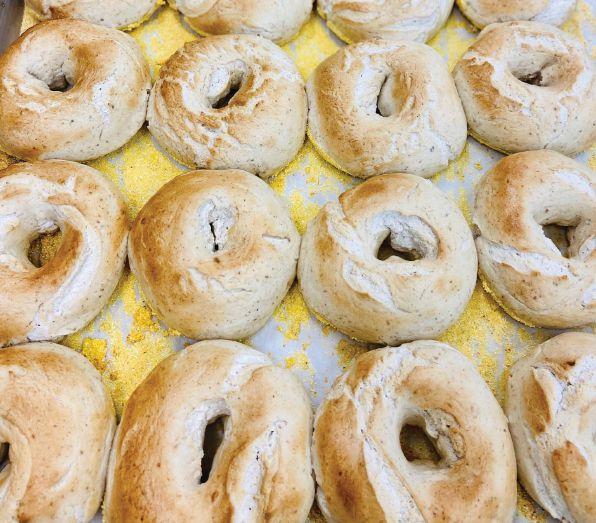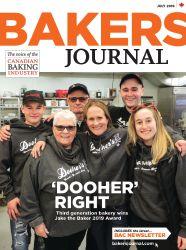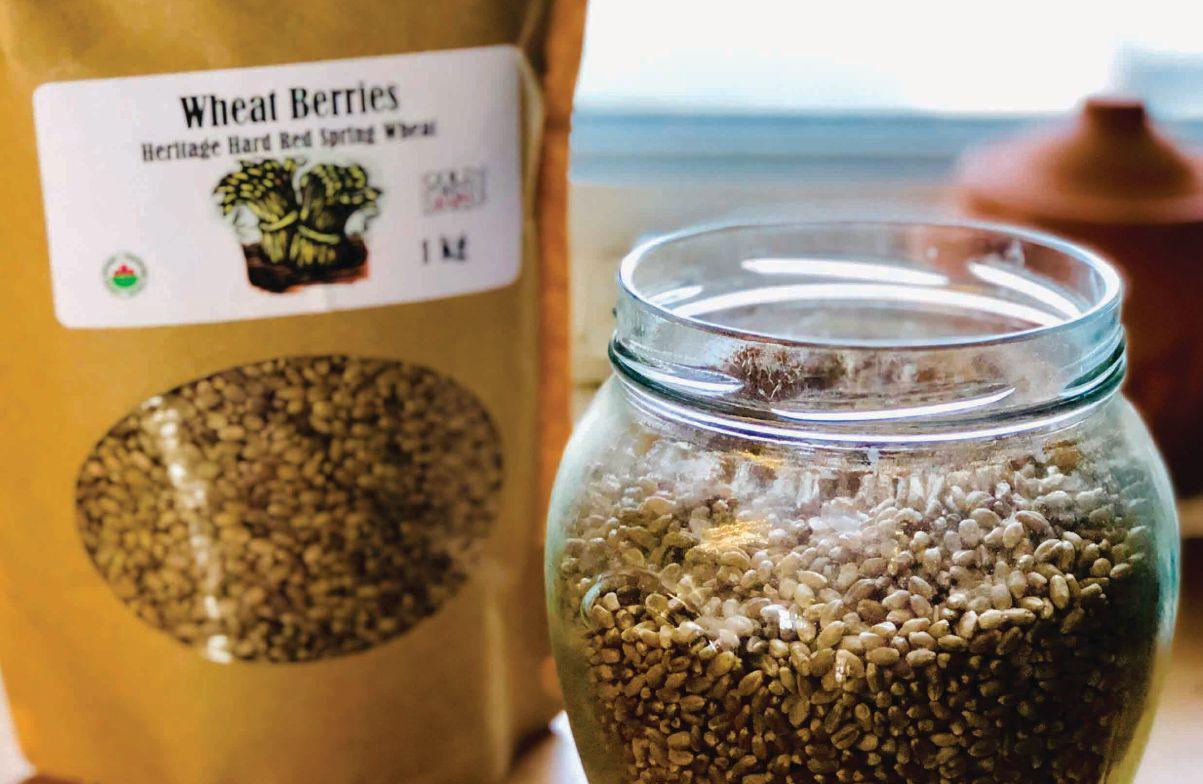


New Name, Same



BY NAOMI SZEBEN







BY NAOMI SZEBEN
Readers must be sick and tired of reading about the pandemic, “The New Normal”, and are likely to just want to move on with their lives. However, the next months will be crucial to the emotional and financial recuperation, now that Stage 3 has allowed more industries to open in Canada. How can we accommodate customers with limited staff or reduced floor space to ensure social distancing? These are some of the changes that we’ve heard from our readers from as early as March of this year.
Everyone’s lives were altered to some extent. In-store bakeries adapted by pre-packaging baked goods so to limit exposure. More stores are opting to offer delivery and curbside pickup, and have updated their websites to reflect these new services. Some bakery cafés have taken advantage of the temporary expansion of sidewalk space to encourage diners to linger safely. The ongoing pandemic has even delayed the much-awaited unveiling of the Jake The Baker contest winner, normally slated for April.

Despite all of these changes, the spirit of serving a neighbourhood remains with Ardent Mills’ recently re-named Jake The Baker contest. Now known as the “Inspirational Bakery of the Year” award, it continues to celebrate bakeries that contribute to their community in a meaningful way. Despite the name change, the values reflected by this contest remain intact. The traditional prize of a cover story and travel to the Bakery Showcase remains unchanged.
Inspirational Bakery of the Year award recognizes bakeries that donate to charities, helps raise funds for worthy causes or are a neighbourhood institution that tourists and locals love to visit. Family-run bakeries understand the value of hard work and know how to bring a smile to their customers’ faces from not just their treats, but by getting to know their clients intimately. Bakeries have made cakes to observe births, deaths and all milestones in between.
Ardent Mills recognizes that some of the values that were previously cherished, such as innovation in baked goods, community service and giving are still as valid as ever today, and won’t change with the contest’s new name.
The Founding Sponsor, Ardent Mills, wants to give nationwide recognition to the bakeries that have kept the economy going during the worst of times and helped raise funds to lift their friends and colleagues during their darkest hour. Despite the availability of governmental emergency funding, many bakeries and cafés are still struggling. Whereas they would have normally helped out with local initiatives, many mom-and-pop shops are now struggling just to stay employed. What little profit margin they have means less of it can go towards communities that relied on the sponsorship of beloved local businesses.
These are some of the changes that herald a new age to the family-owned bakery. However, if there’s something a bakery knows about, it’s resilience: How to adapt to changing tastes, how to expand or reduce inventory and how to keep rolling with the punches. Ardent Mills recognizes that some of the values that were previously cherished, such as innovation in baked goods, community service and giving are still as valid as ever today, and won’t change with the contest’s new name. The ways in which that innovation will be expressed, or how a bakery chooses to give will likely change in the next year. Nevertheless, the love that people feel for bakers and the staple of their neighbourhood will not change. Ardent Mill’s and Bakers Journal’s Inspirational Bakery of the Year contest will continue to instill pride in the winners and make their regions proud. / BJ

OCTOBER 2020 | VOL. 80, NO. 8
EDITOR | Naomi Szeben editor@bakersjournal.com 416-510-5244
TECHNICAL
EDITOR | Julie Istead, Puratos Canada jistead@puratos.com
NATIONAL ADVERTISING MANAGER | Stephanie Jewell sjewell@annexbusinessmedia.com 705-826-2254 1-888-599-2228 ext. 268
ACCOUNT COORDINATOR | Kathryn Nyenhuis knyenhuis@annexbusinessmedia.com 416-510-6753
MEDIA DESIGNER | Curtis Martin
CIRCULATION MANAGER l Beata Olechnowicz bolechnowicz@annexbusinessmedia.com 416-510-5182
GROUP PUBLISHER/VP SALES | Martin McAnulty mmcanulty@annexbusinessmedia.com
COO | Scott Jamieson sjamieson@annexbusinessmedia.com
Mailing Address P.O. Box 530, 105 Donly Dr. S., Simcoe, ON N3Y 4N5
PUBLICATION MAIL AGREEMENT NO. 40065710.
ISSN 0005-4097
Published ten times per year (Jan/Feb, Mar, Apr, May, Jun, Jul, Aug/Sept, Oct, Nov, Dec) by Annex Business Media.
CIRCULATION bolechnowicz@annexbusinessmedia. com
Tel: 416-510-5182
Fax: 416-510-6875 or 416-442-2191
Mail: 111 Gordon Baker Rd., Suite 400, Toronto ON M2H 3R1
Subscription Rates Canada — 1 Year $ 32.00 USA — 1 Year $73.50 Foreign - 1 Year $84.50 All prices in CAD funds.
Occasionally, Bakers Journal will mail information on behalf of industry-related groups whose products and services we believe may be of interest to you. If you prefer not to receive this information, please contact our circulation department in any of the four ways listed above.
Annex Privacy Officer privacy@annexbusinessmedia.com Tel: 800-668-2374
Opinions expressed in this magazine are not necessarily those of the editor or the publisher. No liability is assumed for errors or omissions. All advertising is subject to the publisher’s approval. Such approval does not imply any endorsement of the products or services advertised. Publisher reserves the right to refuse advertising that does not meet the standards of the publication.
No part of the editorial content of this publication may be reprinted without the publisher’s written permission.
© 2020 Annex Publishing & Printing Inc. All rights reserved. Printed in Canada.


“I’m Jim Fontaine and I’m a member of Reiser’s team of Bakery Specialists. I work with customers to improve their bakery applications, such as scaling up their cookie production. I assist them every step of the way—from evaluating their cookie products and processes to developing a solution that will help them reach their goals. And I can do it without changing the integrity of the cookies that made them successful in the first place. Are you ready to increase your cookie production? Let me show you how.”
Watch Jim’s video Contact Jim at (905) 631-6611

www.reiserexperts.com
Reiser Canada Burlington, ON • (905) 631-6611
Reiser Canton, MA • (781) 821-1290
briefly | Free online health and safety classes, New face at Handtmann’s and Rogers announces a new VP of finance | for more news in the baking world, check out our website, www.bakersjournal.com
As the province gradually reopens, the Ontario government is investing $3 million to provide free online health and safety training. These virtual courses aims to make it easier for job seekers and workers to get essential qualifications, while practising physical distancing and preventing the spread of COVID-19.
Up to 100,000 job seekers can now take free online workplace health and safety training through Employment Ontario. There are 10 courses on offer, which include topics such as infection control, conducting health and safety incident investigations, ladder safety, slips, trips and falls prevention, and preventing workplace violence and harassment. Job seekers should contact an Employment Ontario service provider in their area to enroll.
In addition, worker and employer members of Joint Health and Safety Committees can now use video conferencing to take training in real-time with qualified instructors from training providers approved by Ontario’s Chief Prevention Officer. The training includes sessions on how to establish a Health and Safety Committee, resolving health and safety issues, workplace inspections, and accident investigations.
Ontario’s Chief Prevention Officer is extending the time for completion of refresher training for more than 8,000 certified committee members whose certification would have expired between February 28 and August 31, 2020. They have until November 30, 2020 to renew their training, which will be easier thanks to new online options.

Harald Suchanka, managing director of Handtmann Maschinenfabrik GmbH & Co. KG, announced the appointment of Chris D’Aoust as the new managing director of its wholly owned subsidiary, Handtmann Canada Limited.
D’Aoust will assume his new role, taking over the management of Handtmann Canada from Tom Kittle, on July 6, 2020. Kittle remains on the board of advisors for Handtmann Canada and continues as president of Handtmann, Inc. in the United States. The extensive cooperation between the Canadian and US entities will continue without interruption to ensure the highest levels of cross-border support for Handtmann customers.
The new managing director is a resident of Guelph, Ontario and has senior level experience with such well-known companies as Sealed Air and Diversey. D’Aoust has many years of experience leading service teams to all sectors of the food and beverage industry. He has been an active member with the Canadian Meat Council, the Ontario Dairy Council, Masterbrewers Association of the Americas and the Ontario Food Protection Association.

Rogers Sugar Inc. announced the appointment of Jean-Sébastien Couillard to the position of vice president finance, chief financial officer and corporate secretary of Lantic Inc., effective September 8, 2020.
Mr. Couillard previously held CFO roles at ArcelorMittal Canada, Toronto Hydro Corporation and more recently, at Uniboard Canada. His earlier experience included Director of Finance at Group Telecom and Auditor at Ernst & Young. He is a CPA and has a Bachelor’s degree in Business and Administration.
Manon Lacroix left the role August 14, 2020 to move on to the next phase of her career.

Farmers, millers, and bakers, are turning back the hands of time, by reintroducing ancient and heritage grains. For consumers this means new tastes, textures, products and added nutritional value. Touted for their health properties, ancient and heritage grains are higher in protein, fibre, vitamins, and minerals than modern wheat and have
become key industry buzz words.
Historically, over ten thousand years ago, ancient grains were reported in the Fertile Crescent, stretching through the Middle East, from Iran, over to Israel and to southern Turkey. The earliest strains of wheat included einkorn, a word meaning single grain, as well as emmer, also known as farro. Some ancient grains are not even grains but seeds. Think
buckwheat, quinoa, or millet. Yet, in culinary use, all are consumed in the same way. Heritage grains, also known as heirloom have been pollinated through natural sources such as birds and insects. These seeds were passed down through the generations. When European families moved to Canada, in the 1800s and 1900s, they brought seeds with them for their farms. Red Fife is a popular example of an
heirloom grain, that was originally imported to Canada from Scotland, via an Ontariobased farmer named Fife, in the 1880’s. Today, many heirloom seeds are available commercially.
An increased demand for wheat grew, after World War II, during the modern industrial revolution of 1945. Modern wheat, a hybrid of dwarf wheat was developed, to increase crop yield and standardize flours for the commercial food industry.


Gold Forest Grains, a farm located just outside Edmonton, Alberta in Sturgeon County, prides themselves on being a modern wheat free farm, that grows both ancient and heritage grains. All their products are Non-GMO, grown without the use of any chemicals, herbicides or pesticides and is certified under the Canadian Organic Regime, by Pro-Cert Organics.
}“We farm using soil-building organic practices and patiently wait until crops are ripe enough to harvest,” says John Schneider, owner of Gold Forest Grains. Fresh stone milling of their crops, which slowly grinds whole grains from their kernels, takes place almost daily.
To make hard wheat flours the farm grows Red Fife. Then, there is Park Wheat, a natural cross between the Red Fife and Red Calcutta plants, which Schneider says helps produce exceptional sour dough bread. Both Red Fife and Park flours are sold containing the whole grains or sifted for baking a lighter final product.
The most impressive products at Gold Forest Grains, if just for the dedication these crops take, is the einkorn flour with farro. “It’s hard to grow, requires hulling and yields poorly, but we love it anyway,” says Schneider.
using friction.
“Here we are able to produce about 40 tonnes of flour in a 24-hour period,” says Russ Schroeder of Nunweiler Flour. “We are proud of what we do and so are our farmers. We make
“Heritage grains, also known as heirloom have been pollinated through natural sources such as birds and insects. These seeds were passed down through the generations.”
Einkorn flour can be used in place of whole wheat flour in recipes.
Gold Forest Grains also grows buckwheat. This is turned into a finely sifted gluten-free flours, which makes a delicious addition to any quick bread recipe.
The Nunweiler Flour company in Saskatchewan obtains its Certified Organic Grains harvested from a dozen family farms in the Canadian Prairies.
Then, the grains are milled in a low-temperature impact-mill facility. This consists of small steel hammers rotating on high speed, in an enclosed chamber. The hammers strike the grain in mid-air, without
sure the name of the grower goes directly on the on the bag.”
The company produces a wide variety of flours from crops including Red Fife, spelt, buckwheat and barley. Dark rye is the most popular flour. “Our customers buy it to make traditional rye or pumpernickel breads. Robust and hearty breads are really in right now.”
Bakers who prefer to grind their own flour are thrilled to learn the company also sells the whole kernels. Some bakers have purchased small countertop grain grinders, while others are lucky enough to have their own large-scale, working mill on-site.
One such bakery is the Tall
Grass Prairie Bread Company, which has been in business in Winnipeg, Manitoba for over 25 years. After stone-ground milling the grains including Red Fife, spelt and rye, rustic breads are created.
The heavy German rye bread is made from 50 per cent rye flour in both the bread and the sour dough starter. Onion rye contains caramelised onions, beer, molasses, and caraway seeds, while the spelt sourdough is comprised of 100 per cent spelt flour. Tall Grass Prairie Bread Company also makes a wild rice bread made from rice that grows around Manitoba’s shores.
Savvy bakers can enjoy experimenting with new creations in the kitchen by incorporating ancient and heritage grains into their products. The results may lead to a new favourite menu item that customers just cannot get enough of. / BJ
Karen Barr writes about arts, culture and cuisine. She is a graduate of George Brown College and is a Red Seal pastry chef.
The increase in food sensitivities is commonly recognized. The market to cater to allergies and intolerances is growing with The International Journal Of Coeliac Disease, noting significantly higher rates of Coeliac disease in Canada than elsewhere worldwide. The strength of the glutenfree opportunity lies in the loyalty of the gluten-free customer.
THE OPPORTUNITY WITH GLUTEN-FREE BAKING:
Gluten is a group of proteins found in various grains. The choice to avoid gluten is varied; for some such as those with coeliac disease and other chronic illnesses, it is not a choice, it is essential to function. While the rising incidence of intolerances is evidenced as the primary reason for the growth in gluten-free products, many others choose to remove gluten from their diet for health benefits, such as improving digestive function or supporting weight loss.
A survey conducted in 2015 found that 13 per cent of respondents had gluten sensitivity. However, only three per cent of these followed a gluten-free diet despite the discomfort it causes. The Canadian Digestive Health Foundation found that people consume gluten despite the health impact due to low availability. While The NPD Research Group’s findings found that half of the glutenfree consumers are not willing to sacrifice on taste, suggesting that poor taste is another factor in avoiding gluten-free foods. Subsequently, there is an excellent opportunity for bakeries to address these issues, precisely what the True North Bakehouse, run by Jaide Hatfield and Joel Murga in Kelowna, BC is doing.

}According to one web report, there are approximately 2.4 to 3.4 million web searches a month for ‘gluten-free.’
Hatfield and Murga’s journey to gluten-free baking grew from personal frustrations and experiences. Joel was diagnosed Coeliac with a severe allergy to gluten at the age of ten. Murga spent his childhood struggling with lack of availability of gluten-free products, choosing between eating with friends and being unwell, or the loneliness of sitting on the side-lines watching others eat. When they started their bakery selling at local markets and experienced first-hand, the delight of others in finding cakes they could genuinely enjoy, they knew they had to expand their venture.
Gluten-free requires a dedicated baking area with separate appliances and utensils; a severe coeliac cannot tolerate even small regular flour particles. Understandably, not all bakeries can accommodate this, but can offer gluten-friendly baking, which can occur in the same space but with precise steps taken to avoid cross-contamination regarding cleaning, storage and baking processes.
In terms of product quality, Murga stated, ‘there are three aspects, it has to have the taste, it has to have the texture, and has to have the look.’ Hatfield confirmed that ‘if it doesn’t have one of the three, we don’t release it. If it doesn’t look perfect, doesn’t catch your eye, people won’t stop. Then the taste



and texture keep people re-buying’. Hatfield also added that ‘many people buy our stuff and then come back later and ask ‘this is vegan and gluten-free?’, proving that gluten-free can taste as good as standard baking.
However, you will need more patience for gluten-free baking as the flours work differently and Joel advocates for unique flour blends for different products. From Murga’s experience, finding the right combination for each product balances food science with trial and error. Several True North baked goods came from serendipitous experiments. ‘Sometimes when creating new recipes, we don’t realize we’re actually creating something else,’ said Murga, noting an initial effort to create the perfect burger bun made the perfect pizza base. In contrast, a new recipe for bagels became the perfect burger bun. Hatfield highly recommends seeking advice from an experienced gluten-free baker, suggesting that due to the higher cost of gluten-free ingredients, the development time saved through expert advice could also be cost-saving.
It is estimated that the gluten-free market will grow by 8.25 per cent CAGR (Compound Annual Growth Rate) by 2023, and North America was the largest gluten-free market in 2019 of a global market estimated around $5bn (8)
Murga discussed how gluten-free products have a shorter shelf life, which he noted means you need to communicate clearly to your customers. Products that can freeze are a helpful solution; this allows the True North Bakehouse to sell their bread in the frozen section of local supermarkets and enables

Later this year, Hatfield and Murga will fulfil their ambition of adding a physical bakery, providing much-needed space for increased baking demand, while also creating a space where friends can come together to enjoy fresh baked goods together.
customers to buy and freeze other products later. Finally, it is crucial to understand why your customer is buying. Many gluten-free customers have intolerances. To support this, Hatfield and Murga choose to avoid processed ingredients as much as possible; they removed the yellow dye from their Nanaimo bars based on customer requests. While gluten-free products will be more costly to produce, customers of this under-serviced market indicate that if you deliver on look, taste and texture, most would rather pay a little more and enjoy a delicious treat.
The gluten-free market is already in your community. Wholesale is 80 per cent of the True North Bakehouse’s business in terms of sales. Its value exceeds that through its function in driving business awareness. As a gluten-free bakery, you provide the solution to local cafés, restaurants, and stores that cannot bake allergen-friendly produce themselves. By providing gluten-free products to their local region, the True North Bakehouse quickly expanded their business.
ai1598375077130_9639LA_Bakers 1_4 page AD Oct 2020.pdf 1 2020-08-25 1:04 PM



Our high-quality maple syrups are 100% natural with absolutely no chemicals or preservatives
Maple Syrup provides several essential nutrients One 60 ml (1/4 cup) serving of maple syrup contains 72% of the daily nutritional requirement of manganese, 27% of riboflavin, 17% of copper and 6% of calcium

According to one web report, there are approximately 2.4 to 3.4 million web searches a month for ‘gluten-free’. An online presence is significant in engaging your potential customer. Reaching out to local allergen-friendly groups such as your local Coeliac or Autoimmune societies is a good starting point. They are often highly active in promoting businesses that cater to their members; Hatfield and Murga collaborated with Camp Coeliac in Kelowna in 2019, taking their donuts to a new but highly relevant audience. Collaborations with relevant local businesses and influencers could access the right customers for your gluten-free products more cost-effectively than advertising. Hatfield enthused that ‘you reach so many more people without knowing it…when you partner with bigger companies with bigger clientele.’ What is clear is that for Hatfield and Murga, this is as much about serving their local community as building their business.


For more information please contact us at customer@themapletreat.com

ROUND-UP OF THE GLUTEN-FREE OPPORTUNITY:
Increasing rates of food sensitivities and growing endorsement of healthy eating by celebrities and other influencers will continue to drive this burgeoning market. According to a Mintel report, as much as 19 per cent of the food industry’s growth in 2019 came from gluten-free products with other research showing that the bakery section has the highest growth in this area. Consequently, allergen-friendly baking could be a positive diversification for your bakery. Being the baked goods solution that brings friends and family together despite differences in what they can eat is a real opportunity in business and community. As Jaide and Joel both noted without hesitation, the best part of the job is ‘seeing the joy on people’s faces.’ / BJ
Emma Davies is a British freelance writer based remotely in Canada. She specializes in writing articles on health, wellbeing, self-development and business.





Calls for a new Grocery Code of Conduct to regulate the business practises of Canada’s largest grocery retailers and their vendors. In August a group of 5 food and farm industry associations (Baking Association of Canada, Canadian Beverage Association, Canadian Federation of Agriculture, Food & Beverage Canada and Food & Consumer Products of Canada) published an open communique in response to the latest round of fees introduced by large grocery retailers on their suppliers. In Canada 5 grocery retailers are responsible for some 80% of sales.
The communique noted that these fees
were being introduced at a time when farmers and food and beverage processors are already facing a complex web of arbitrary fees and penalties in their relationships with large grocery retailers, in addition to managing the on-going impact of Covid-19 on Canada’s food system.
According to Food Consumer Products Canada costs to get and keep products on store shelves has risen more than 20 percent since 2012, while remaining flat in the United States. In addition more than 80 percent of new branded products on Canadian store shelves were developed abroad.
The 5 associations stated that arbi-


trary fees and penalties imposed by large grocery retailers on Canadian farmers and food and beverage processors negatively impact Canadian consumers as it results in lower investments and product innovation. Requiring food and beverage suppliers to cover the cost of investments in retail stores will come at the expense of the farmers’ and processors’ own investments in their Canadian facilities. This is particularly challenging for small and medium size businesses said the associations.
The communique called for a Canadian Grocery Code of Conduct to be introduced similar to that which was introduced by the UK Government in 2009 to intervene and legislate against inappropriate practices through the introduction of a ‘Groceries Supply Code of Practice’.
Later in August the five associations were joined by the Canadian Federation of Independent Grocers and Canadian Federation of Independent Business in a request that the Government of Canada include in the upcoming Throne Speech, a commitment to begin the process of establishing a Grocery Code of Conduct for Canada.
While a Federal Grocery Code of Conduct may be mostly voluntary, it would provide leadership to Provincial governments to introduce regulatory enforceable Codes.


Dave
Switch over and get 50% off our regular fees and the second year free!” You know the deals; you hear them all the time. Whether its phone services, internet providers, subscription newsletters or magazines, insurance, security systems, and a variety of other goods and services, it seems that some businesses want to offer deals to new customers that they refuse to offer to loyal clients.
Recently I negotiated a 75% discount on a service that I receive to my house after I told the supplier that I believed I no longer needed it. I had been a customer of this company for 35 years and I felt that they had taken my loyalty for granted. In an effort to stop my departure they reduced my costs substantially and then came the pitch for additional services. Because I was ready to upgrade my internet services, I took their offer on a twoyear contract. We settled on a price and everyone seemed happy.
Two hours later, the company was desperately calling and emailing me. It seems that they had made a mistake. They had bought out my service provider the previous month so I was already their customer and they couldn’t offer me any deals. They apparently were prepared to offer substantial deals to strangers but not to friends. We see these senseless

practices all the time in business. Why would you treat an unknown new customer better than you treat a customer who has been loyal to you for years? Why is it that we think that these new customers are going to stick around after their contract expires?
Unfortunately, this type of thinking breeds discontent with loyal long-term customers. When your loyal customers feel neglected and mistreated compared to your new customers there is a level of discontent that breeds embitterment. I had someone this week tell me how upset they feel when they see this practice but are refused a similar deal after contacting their supplier.
Companies need to realize how embarrassing this is for staff who must deny these
deals to loyal customers. Not only are they setting their employees up to respond to irate customers, but the customer now has to make a choice between staying with that company and looking elsewhere for a similar product or service.
A better way to handle business development is to create an environment where there is substantial value for new clients to do business with your firm while recognizing and rewarding loyalty. By being proactive with pricing and transparent with deals, trustworthy companies will not only adjust prices for short dated products and services but offer new products, services and technologies to existing customers at rates similar to those they are offering to new prospects.
Service providers would gain much more respect offering their customers advantages months before their contracts expired instead of waiting until the last minute or by notifying them of beneficial newly obtained products.
Taking care of our customers can be a lot of work, however there are studies that show it costs five to ten times as much to bring a new customer up to speed than to take care of an existing one. Treating our loyal customers with honor and respect should include giving them proactive pricing and consideration for their dependable patronage. Failure to achieve this results in a dysfunctional business model necessitating a ceaseless search for new customers.
You are involved in the Canadian baking industry, care about consumers, and understand the value of being connected and informed. Here is what we will do for you and your success.
As the industry’s voice with government, BAC responds to key competitiveness issues including nutrition policy, product labelling and the environment on your behalf.
This flagship event for Canada’s baking industry is the place for connecting, learning and building relations, and additional B2B events hosted across Canada are ideal forums for your business growth.
Provide Resources & Information
Expert assistance and latest resources support your business success while The Bulletin and Bakers Journal keeps you fully informed.
We tell the baking story to consumers debunking myths and sharing the positive.
By partnering with colleges and universities and providing scholarships we support education and career pathways where skills are needed.
Offer Discounts & Savings
Member perks are providing savings with insurance and group RRSPs and discounts on Bakery Showcase exhibitor space, website links, etc.



The BAC BC Chapter would like to extend it’s sincere appreciation to this year’s 2020 Virtual Platinum Sponsors for supporting local BC based baking education programs. Educational funds will be donated for scholarships to the Vancouver Community College and Vancouver Island University.

BY BONNY KOABEL CPA, CGA
Online marketing and website Development grants of up to $2,500

As a result of COVID-19 bakeries have redesigned or are looking to redesign their website to include on line ordering, and curbside pickup options for their customers.
If your business in the process of redesigning your website or implementing a Digital Marketing strategy, consider the Digital Main Street (DMS) part of the Digital Transformation Grant Funding program. DMS provides funding for training, advisory support, and grants up to $2,500 to Small Businesses that are implementing digital marketing strategies.
The Digital Transformation Grant (DTG) is available in Ontario and provides Small Businesses with:
• The digital literacy skills they need to execute their digital transformation by completing an online training course that provides the basics of how digital technology will transform their business for success. A grant of $2,500 to assist with the execution of their Digital Transformation plan.
In order to qualify for funding, you must meet the following criteria:
• Your business must be located in or close to a downtown main street or a (BIA) Business Improvement Area. Your company must employ 1-10 employees (or fewer than 25 employees if they are a café or restaurant. Employees must be on payroll and tax deductions must be made.
• Your bakery must be paying commercial property tax (commercially assessed), either directly or through commercial rent.
• Your company must be a registered business in Ontario and/or is incorporated.
• Your bakery is open for business/ operating at the time of application and not a start up. The business will be ineligible for
funding if any of the following criteria apply:
• If your company is purely on-line.
• Your bakery is a franchise, including those individually owned and operated.
• Your bakery or cafe is a not-for-profit or charitable organization.
• Your company is not renting office space on a temporary basis (month-tomonth).
Your bakery must be owned an Ontario resident operating a business in Ontario. It must run by a person or group of people 18 years age or older at the time of application, and be a Canadian citizen or permanent resident.
In order to get started with funding go to: https://digitalmainstreet.ca/marketingnew-economy/#
Once on the site you will need to complete the following: The assessment, the eligibility quiz, the online training and the developing a digital transformation plan.
Under the DTG, the following costs are eligible:
• Digital Marketing costs including: Hiring a consultant, agency or person to execute Digital Marketing initiatives
• Website costs including redesign or improvement of existing website or development of a new website
• Software purchases including graphic design software, productivity Software (LastPass, Hootsuite, Dropbox, etc and Social Media Software (Hootsuite, Buffer, etc.)
• Security Software
• Purchases of other website related software may qualify for funding. Businesses will need to be approved by Digital Main Street prior to software purchase.
• Digital Training costs:
• Ongoing digital training courses (in-person & online)
• Hardware costs:
• Must be hardware deemed necessary for digital marketing expenses
Under DMSG the following are ineligible for funding: The purchase of Microsoft Office, website hosting, domain name renewal, software subscription renewals,
Microsoft Software subscription renewals, signage and printing, logo redesign and rebranding, business owner’s salary or current employee salary for executing the project, costs related to land, building or vehicle purchase, costs of intangible assets such a goodwill, whether capitalized or expensed, depreciation or amortization expenses. It will not cover interest on invested capital, bonds, or debentures, bond discount, monthly mortgage, loan and/or rent payment refinancing of an existing debt or losses on investments, bad debts, and any other debts. It won’t cover payments of fines or penalties costs related to litigation hospitality and entertainment costs franchise fees and/or franchise license costs lobbyist fees or new capital expenditures, either.
If your Small Business has previously received funding through the Digital Transformation Funds you may apply for funding a second time as long as all of the reporting and project receipts have been submitted for the previous funding received. The Digital Transformation fund is focused on small businesses, therefore large corporations should not apply for funding. Small Businesses with multiple locations are only eligible to apply for one Digital Transformation Grant. Owners with multiple businesses may only apply for one Digital Transformation Grant.French translation assistance is available to applicants upon request.
Digital Transformation Funding has been available for a few years now. If your company is new to digital marketing or if you would like to learn more, the fund has compiled a list of tools, how-to guides and tutorials available to assist small businesses with embracing digital technology. To learn more on how build your online presence, using social media effectively, paid advertising, and much more go to: https://digitalmainstreet.ca/case-studies/
Bonny Koabel CPA, CGA is President of AKR Consulting Canada, a Mississauga, ON firm specializing in Government Grants, Rebates, Refunds, Subsidies and Tax Credits.
COVID-19 has affected many bakers, but Kettlemans Bagels rose above it all. Most of their sales are driven by dine-in and take-out orders. “To give you an idea, our three stores that generate about $12 million annually in revenue, and only 10 per cent of that is from wholesale,” said company Director of Operations Amer Wahab.
The bagel franchise attributes its popularity to the quality of its product, made with a high protein
flour. “We use a high gluten flour, packaged for us by ADM,” explains Craig Buckley, the Founder of Kettlemans. “It’s the flour we’ve been using over the last 20 years. Everybody talks about how great the pasta is in Italy and how the bread in
}enough.”
The bakeries have earned a devoted following, attributed not just to Kettlemans bagels alone: Where the bakery is devoted to its standards of quality in flour and tradition, that same attention to excellence is paid back in its
“Who doesn’t want to come to Kettlemans and have a great bagel, and know that the money generated from that is going to go towards a good cause?” — Craig Buckley
France is amazing. The funny thing is that all of Europe brings in Canadian flour to strengthen their flour: the flours they have aren’t strong
attention to the community it serves.
“That’s a philosophy that we share,” says Wahab. “Buckley also adds, “it’s an
opportunity for us to help, not just driven by us, but by the cause itself,” referring to their initiative, ‘Dine to Donate.’ “Who doesn’t want to come to Kettlemans and have a great bagel, and know that the money generated from that is going to go towards a good cause?” He adds that offering their bagels as a motivation to give to charity has worked well. “Dine to Donate,” was set up to raise funds between an announced period of time on set dates: Whenever someone buys bagels, “all revenue generated between that time, we give 100 per cent to go to
Ottawa’s Glebe neighbourhood Kettlemans. The bagel café chain is gaining popularity, and is expanding to multiple locations across Canada.

that cause,” explains Wahab.
Among many of the bakeries charities Kettlemans donates to, Camp Misquah is the charity that is closest to their hearts.
“The Misquah Recreational Group is dedicated to providing a memorable experience to people with developmental disabilities of all ages, and to ensure that the experience is financially accessible for all,” stated Wahab.
“We’re proud to support our neighbourhoods through in-shop fundraisers, gift card fundraising and in-kind donations. Our team will work together with your group and schools to create a unique and memorable fundraiser.”
The bakery utilizes social media to promote their charity work as well as their face-to-face network of clients, friends and family. Much to Wahab and Buckley’s delight, their “Dine to Donate” initiative raised thousand of dollars within four hours to the aforementioned Misquah Recreational Group.
“You don’t want to advertise the initiative too far in advance and you want to keep it fresh in peoples’ minds, so we usually start about four days prior, and then the day of the event, too,” suggests Buckley.
How does the bakery choose which charity is worthy of promoting through their Dine to Donate program? “We get a lot of people asking for donations daily and everybody is deserving. You know, there’s so many people that are looking for donations that are badly needed…we’re still a relatively small business, unlike, say, Apple or Walmart,” said Buckley. “What we did was to pick a charity that meant a lot to us. Amer knows someone who bought Camp Misquah for all the right reasons, to help the association. They brought it to my attention, which meant a lot to me, because a close childhood friend was born with Down Syndrome.” Buckley adds that charities for people living with developmental challenges often do not get the amount of donations they need.
“Any fundraisers that we do, will go towards Camp Misquah, since they need so much. We’re just a drop in the bucket, because they need a new kitchen and dining room… they need a whole bunch of stuff, so we’re trying to help as best we can.” Buckley adds that he was amazed how the group operates on a 100 per cent charity budget without profit to provide a camp for mentally delayed
children and adults.
Buckley adds that Kettlemans is in a unique position to help. “Unlike other small bakeries, where a lot of their customers come from within a five or even ten kilometer radius, our stores are basically factories, so people come not just from in and around the city, but within the province and Canada as well. They come to our store specifically because they love our offerings.”
Kettlemans Bagels has a generous

heart, and their brand is growing. In discussion with Bakers Journal,Buckley offered that they intend to open a shop in Toronto. “Hopefully in late September. We’ve already started construction.” With big hearts and a wide fan base, Kettlemans is sure to win over more clients in the future. / BJ
If you would like to help Camp Misquah go online to: https://www.campmisquah.com/donate


It’s no secret that everyone is looking forward to life “returning to normal.” However, many business owners – including bakers – know that returning to normal isn’t something that is possible or that makes good business sense. Savvy business owners are uncovering a new normal that capitalizes on social distancing, best health practices, and on giving customers the products and delivery methods they want to feel safe.
As you think about this new normal – one that will more than likely include a second COVID wave sometime this year, consider these strategies for staying ahead:
Today, there are several options for making delivery a part of your business plan. Bakers can partner with providers like DoorDash or GrubHub to get their baked goods into the hands of your customers. Or, you can formulate your own delivery service that helps you connect with customers even more directly. If you’re thinking about implementing delivery, consider factors like your delivery radius, the days you’ll deliver, minimum order requirements, or delivery charges. Consider starting a weekly delivery – think of milk men from times past – where customers opt in for their weekly stash of doughnuts or other baked favourites.

}Consider starting a weekly delivery – think of milk men from times past – where customers opt in for their weekly stash of doughnuts or other baked favourites.
graduations, Thanksgiving, holiday seasons and other celebration moments.
Many bakers ramped up their gift card programs as a way to stabilize revenue when doors were closed. Now that things are opening up, don’t forgo your gift card sales. These are a smart way to bring dollars into your bakery. Consider selling them individually or in packs. You can even develop gift cards for specific times of the year like
Packaging took on many different forms in quarantine. From single serve containers, to kits, to no-touch options that kept customers and staff safe, packaging is definitely a smart business strategy for selling in these challenging times. Continue to offer and promote varying packaging options so that customers know you’re still focused on their welfare and safety.
No matter what your plans are for the next wave of COVID, be sure to share your best practices on social media. Customers want to know that safety is still top of mind for your business and that you’re creative in how you’re adapting your operations. Posting regular updates on your social distancing initiatives and communicating in your shop with colourful signage are smart ways to connect to your audience and help them feel safe to shop with you. / BJ
Ken Weir is the Senior Marketing Consultant for Dawn Foods

With their nutty crunch and sweet mild flavour, California Walnuts are the perfect addition to your creations.
73% would purchase a food product knowing it contains walnuts.* 78% said walnut health benefits positively impacted their purchase decision.*
*2019 Rose Research online consumer survey

The only product with yield information for more than 1,000 raw food ingredients, The Book of Yields, Eighth Edition is the chef’s best resource for planning, costing, and preparing food more quickly and accurately.
Now revised and updated in a new edition, this reference features expanded coverage while continuing the unmatched compilation of measurements, including weight-to-volume equivalents, trim yields, and cooking yields.
With helpful worksheets; a clear organisation by food type; and a convenient, durable comb binding, The Book of Yields, Eighth Edition is a must-have resource. $56.95 Item
BY DIANE CHIASSON
Baked goods sell more in the autumn; take advantange of the season to perk up bakery sales.

Autumn is peak produce time. Pumpkin, apple, cinnamon, plum and caramel cakes are features heavily during this season. Get your bakery ready for your customers’ fall favourites. Here are six simple ideas to get your bakery ready for autumn.
Add a sense of warmth and comfort by adding seasonal décor to your bakery operation with wreaths, fall foliage, real carved pumpkins and gourds aand multicoloured mini lights. Add small details like napkins with fall hues. Whether you look to seasonal produce or fragrant spices, you will find the natural hues of autumn never fails to create a cozy ambiance.
}avoided). Post hygiene instructions in English or French and the majority workplace language so everyone can understand how to do their part. Introduce more fresh air by increasing the ventilation system’s air intake or opening doors and windows. Avoid central recirculation where possible. Maintain a safe distance while handing goods and taking payment, minimize or eliminate handling of cash and eliminate at-the-door payment methods. Assign staff to ensure customers are maintaining safe physical distances in congested areas like entrances/exits and check-outs.
Farm-to-table is a national movement that helps consumers and food business operators understand where food comes from, and encourages customers to buy as close to home as possible. One of the most popular menu trends at the moment is a focus on freshness. Buying
One of the most popular menu trends is a focus on freshness. Buying local food, using seasonal menus and partnering with farmers’ markets.
When the weather gets colder, germs spread quicker. Start this new season off, particularly during this pandemic, in perfect shape. Your catchphrase should be ‘fall cleaning’. Recent research shows that restaurant cleanliness is more important to patrons than customer service.
Provide ways to properly clean hands, by providing access to soap and water or alcohol-based hand sanitizer. Give cashiers, drive-through operators, delivery staff and other customer-facing staff with hand sanitizer for their use only. Have all employees and visitors wash their hands thoroughly with soap and water before entering the workplace and after contact with surfaces others have touched. Provide a safe place for customers to dispose of used sanitizing wipes and personal protective equipment. Sanitize shared equipment (where sharing of equipment cannot be
local food, using seasonal menus, and partnering with farmers’ markets. More and more foodservice operations in Canada embrace local farms as business partners. During these challenging times, there is a growing awareness among consumers about buying local and understanding where their food is from.
The farm food tastes much better and is healthier. It’s definitely a good marketing tool and can help spruce up your regular menu. I strongly suggest that you take the time to visit your local farmers’ markets. Why don’t you head to a local farmers market just to find inspiration and to also view the latest fresh and local produce? Introduce yourself to the farmers and find out more about the types of food they grow, and what they can offer you as a bakery/restaurant food supplier.
How about adding to your menu some delicious fruit galettes, apple dumplings, mini ginger snaps, potato leek soup served with brown bread in the
wintertime, and other hearty fall food menu items. Whatever you do, make sure that you have endless combinations of flavours, textures and colours that will continually encourage your customers to buy from your bakery.
When you think your staff members have been trained enough, keep going. If they lose some precious minutes or prepare the wrong order, it could equate to a huge loss in revenue and also in reputation. If you have recently hired some new employees, you will want to properly train them before they hide behind your bakery cases. Make sure that your new employees can wear multiple hats, and are educated about the important elements of your bakery. Your staff members should know everything about every menu items that you sell, including seasonal items, the operations of your bakery, and the customer service standards. Even your well-seasoned staff members may need a refresher course. Offer ongoing training sessions to help your staff stay sharp, motivated, and become better customer service representatives.
You should definitely work with other neighbourhood stores to pool your resources as well as your media reach. Try to throw an autumn-themed weekend event with food, entertainment, and lots of promotions. Email the members of your community and your best customers to invite them to this special event. Don’t forget to donate to your favourite charity organizations. You will not only raise awareness about your business but you will also become a good neighbour. / BJ
Diane Chiasson, FCSI, president of Chiasson Consultants Inc., has been helping foodservice, hospitality and retail operators increase sales for over 35 years by providing innovative and revenue-increasing food service and retail merchandising programs, interior design, branding, menu engineering, marketing and promotional campaigns. Contact her at 416-926-1338, toll-free at 1-888-926-6655 or chiasson@chiassonconsultlants.com , or visit www.chiassonconsultants.com
Presented by








A guide to making artisan breads practically and profitably, “Bread Baking: An Artisan’s Perspective” includes step-by-step instructions on mixing, fermentation, shaping, proofing and retarding, and baking. Written for both experienced and novice bakers, “Bread Baking” contains more than 150 helpful photos and drawings that illustrate techniques and showcase beautiful artisan bread products. Artisan bread baker and teacher Dan DiMuzio provides invaluable information on troubleshooting,












BY JANE DUMMER, RD
What’s new in fat alternatives for baking applications.
Get the skinny on EPG and clean label ingredients.

Consumer’s interest in health and wellness has resulted in bakers addressing calorie reduction. Fat is a key ingredient; it’s necessary for product developers to understand their current formulation and the functionality of the specific fat in the recipe. It is finding the balance between how much can be changed while still maintaining quality. There have been vast improvements for fat alternatives and replacers since the days of olestra (which none of us in the food industry want to recall). New to the market is EPG (esterified propoxylated glycerol). It is a modified plant-based oil, from the rapeseed plant.
}Sarah Malenich, Senior Director of Marketing, Epogee LLC, explains “EPG is a solid, alternative fat, that tastes and functions like traditional fat. But because EPG is not broken-down during digestion, the fat calories are not absorbed by the body. That is how we’re able to reduce caloric intake by up to 45 per cent or more per serving, depending on the formulation. The reason EPG works is, the propoxyl link resists digestive enzyme action, thereby controlling caloric release through the key part of digestion, while allowing later breakdown in the environment. Instead of delivering the usual 9 calories/gram of fat, EPG only delivers 0.7 calories/gram.”

processes like baking and/or frying without degradation. During the manufacturing process EPG is heated to
EPG is a fat alternative that resembles a triglyceride in structure and it does not block absorption nor deplete key nutrients from foods, therefore offering calorie reduction while maintaining the nutrition profile.
260°C (~500°F) for an extended period so heat stability is a part of the technology. Because EPG is made from fat, it still functions as a fat from a taste, texture, and aroma standpoint. EPG is considered clean label and performs in a wide variety of baking applications from cookies and cakes to laminate doughs and even frying for donuts.”
of consumer purchasing decisions.”
EPG is a fat alternative that resembles a triglyceride in structure and it does not block absorption nor deplete key nutrients from foods, therefore offering calorie reduction while maintaining the nutrition profile. For the baking industry Malenich describes, “EPG is a highly heat stable alternative fat. Because of its physical composition and unique manufacturing process, it can withstand exposure to heat from
Consumers continue to trend towards natural and unprocessed ingredients. The marketing term “clean label” has become extremely popular. Ingredient suppliers formulate for “clean label” using ingredients without binders, enhancers and preservatives. Robert Lambert, head of marketing & communications, Ulrick & Short, explains, “Calorie reduction is a consumer trend that will only continue with the global obesity epidemic. Healthier, lower calorie products are being demanded by consumers and government bodies alike. Consumers have more information at their fingertips than ever before, and factors such as health, sustainability, and ethics are part
Lambert identifies, “Ulrick & Short fat replacement range is clean label, meaning our ingredients neither contain, nor have been processed with any chemicals, additives, or e-numbers, and has a consumer-friendly back of pack declaration. They are fat mimetic, replacing the functional properties of fat in terms of volume, mouthfeel, moisture retention, and binding, all while ensuring eating quality is maintained. Many of our delyte™ products are based on tapioca. Tapioca starch granules are smoother and more rounded when compared to other base crops, making it an ideal ingredient to provide indulgence and mouthfeel in a range of applications. delyte 10 is wheat-based and is a recent addition to our fat replacement range. It has been developed to reduce up to 25 per cent of fat in pastry, while maintaining colour, texture, bite, and flavour.”
There is no one solution when it comes to reformulating for calorie reduction. Fats have different functionalities depending on the source of fat, and what the final application is. Therefore, understanding the function of fat in all applications, and how it reacts through different baking processes, is essential. / BJ
Jane Dummer, RD, known as the Pod to Plate Food Consultant, collaborates and partners with the food and nutrition industry across North America. www.janedummer.com
















































































































































FRITSCH is part of the MULTIVAC group
FRITSCH is part of the MULTIVAC group FRITSCH is part of the MULTIVAC group
FRITSCH is part of the MULTIVAC group









































































































































































































































FRITSCH IMPRESSA bread – great-tasting, natural products with an artisanal look are no challenge. Proven SoftProcessing technology guarantees exceptionally gentle processing of soft dough and allows high output and absolutely stable operation. With the new Soft Dough Sheeter, the system is now ideal for artisan bread products of the highest quality. Find out more at www.fritsch-group.com
FRITSCH IMPRESSA bread – great-tasting, natural products with an artisanal look are no challenge. Proven SoftProcessing technology guarantees exceptionally gentle processing of soft dough and allows high output and absolutely stable operation. With the new Soft Dough Sheeter, the system is now ideal for artisan bread products of the highest quality. Find out more at www.fritsch-group.com





